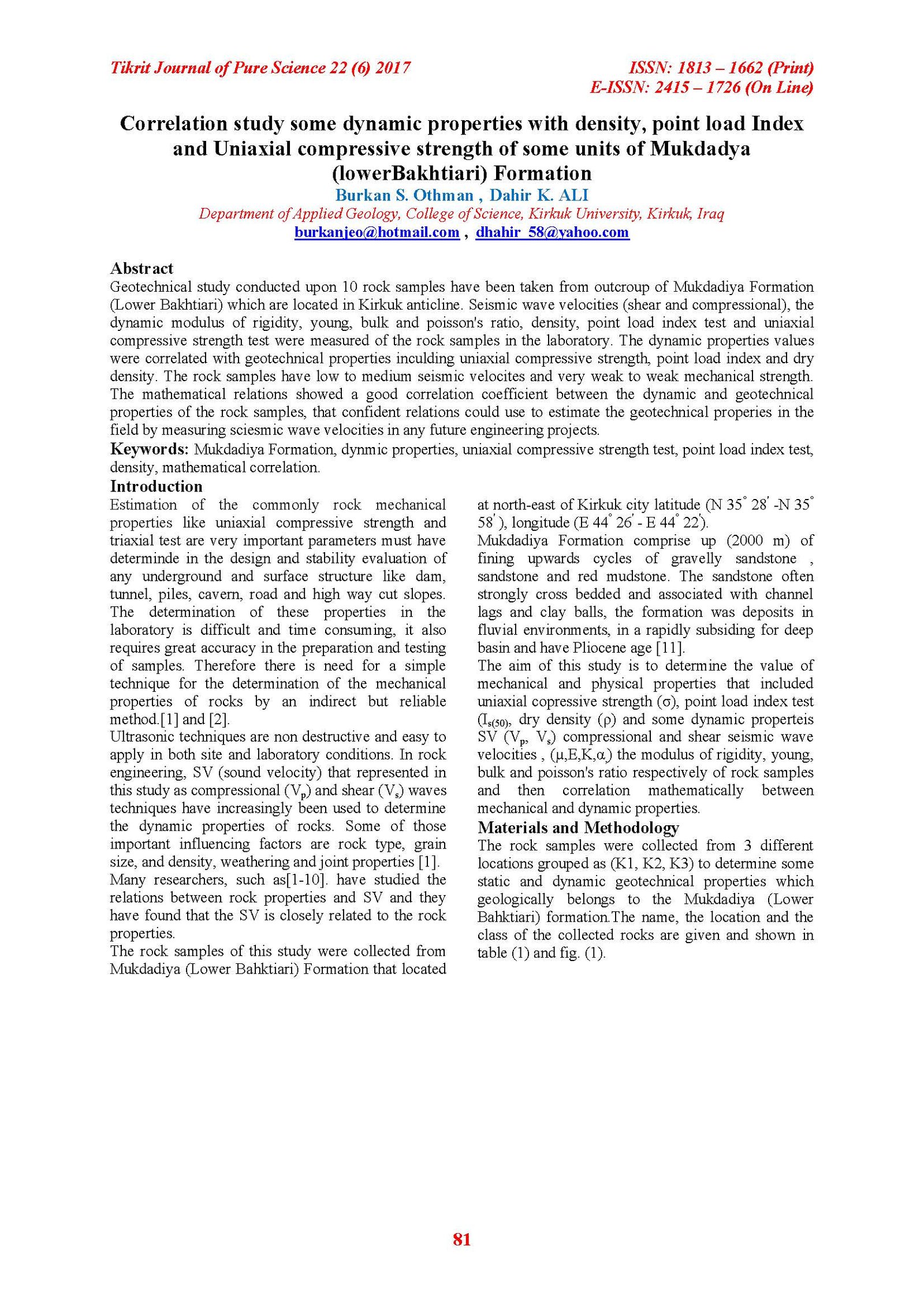Correlation study some dynamic properties with density, point load Index and Uniaxial compressive strength of some units of Mukdadya (lowerBakhtiari) Formation
Main Article Content
Abstract
Geotechnical study conducted upon 10 rock samples have been taken from outcroup of Mukdadiya Formation (Lower Bakhtiari) which are located in Kirkuk anticline. Seismic wave velocities (shear and compressional), the dynamic modulus of rigidity, young, bulk and poisson's ratio, density, point load index test and uniaxial compressive strength test were measured of the rock samples in the laboratory. The dynamic properties values were correlated with geotechnical properties inculding uniaxial compressive strength, point load index and dry density. The rock samples have low to medium seismic velocites and very weak to weak mechanical strength. The mathematical relations showed a good correlation coefficient between the dynamic and geotechnical properties of the rock samples, that confident relations could use to estimate the geotechnical properies in the field by measuring sciesmic wave velocities in any future engineering projects.
Article Details

This work is licensed under a Creative Commons Attribution 4.0 International License.
Tikrit Journal of Pure Science is licensed under the Creative Commons Attribution 4.0 International License, which allows users to copy, create extracts, abstracts, and new works from the article, alter and revise the article, and make commercial use of the article (including reuse and/or resale of the article by commercial entities), provided the user gives appropriate credit (with a link to the formal publication through the relevant DOI), provides a link to the license, indicates if changes were made, and the licensor is not represented as endorsing the use made of the work. The authors hold the copyright for their published work on the Tikrit J. Pure Sci. website, while Tikrit J. Pure Sci. is responsible for appreciate citation of their work, which is released under CC-BY-4.0, enabling the unrestricted use, distribution, and reproduction of an article in any medium, provided that the original work is properly cited.
References
[1] Yasar E., Y., Erdogan, 2004. Correlating sound velocity with the density, compressive strength and Young’s modulus of carbonate rocks. International Journal of Rock Mechanics & Mining Sciences 41 (2004) 871–875
[2] Deere DU, Miller RP.,1966. Engineering classification and index properties for intact rock. Air Force Weapons Lab. Tech. Report, AFWL-TR 65-116, 1966, Kirtland Base, New Mexico.
[3] Inoue M., Ohomi M., 1981. Relation between uniaxial compressive strength and elastic wave velocity of soft rock. Proceedings of the International Symposium on Weak Rock. Tokyo, 1981. p. 9–13.
[4] Babuska V, Pros Z., 1984. Velocity anisotropy in granodiorite and quartzite due to the distribution of microcracks. Geophys J R AstronSoc 1984;76:121–7.
[5] Gaviglio P.,1989. Longitudinal waves propagation in a limestone: the relationship between velocity and density. Rock Mech Rock Eng 1989;22:299–306.
[6] Kern H., 1993. P and S wave anisotropy and shear-wave splitting at pressure and temperature in possible mantle rocks and their relation to the rock fabric. Phys Earth Planet Inter 1993;78: 245–56.
[7] Barruol G, Kern H., 1996. Seismic anisotropy and shear-wave splitting in weaker-crustal and upper mantle rocks from the Ivrea zone experimental and calculated data. Phys Earth Planet Inter 1996;95:175–94.
[8] Karpuz C, Pasamehmetoglu AG.,1997. Field characterization of weathered Ankara andesites. Eng Geol 1997;46:1–17.
[9] Kahraman S., 2001. Evaluation of simple methods for assessing theuniaxial compressive strength of rock. Int J Rock Mech Min Sci. 2001;38:981–94.
[10] Sarkar K, T. N. Singh, D. Venkart Reddy, 2012. Prediction of Strength Parameters by Dynamic Wave. International Journal of Earth Sciences and Engineering ISSN 0974-5904, Vol. 02, No. 01, February 2009, pp. 12-19.
[11] jassim Saad Z. and Jeremy C. Goff, 2006. Geology of Iraq. published by Dolin, praque and Moravian museam, brano. first edition.
[12] (google earth;http://teachmideast.org)
[13] Anon.,1979. Classification of rocks and soils for engineering geological mapping. Part 1—Rock and soil materials. Bull Int Assoc Geo 1979a;19:364–71.
[14] ISRM, 2007. The complete ISRM suggested methods for rock characterization, testing and monitoring: 1974–2006. In: Ulusay, Hudson (Eds.), Suggested methods prepared by the commission on testing methods, International Society for Rock Mechanics. ISRM Turkish National Group, Ankara, Turkey. 628 pp.
[15] American Society for Testing and Materials. (2002). ASTM D2938-95 Standard Test Method for Unconfined Compressive Strength of Intact Rock Core Specimens. West Conshohocken, USA
[16] American Society for Testing and Materials. (2010). ASTM D7012–10 Standard Test Method for Compressive Strength and Elastic Moduli of Intact Rock Core Specimens Under Varying States of Stress and Temperatures. West Conshohocken, USA.
[17] ISRM. Suggested method for determining point load strength. Int J Rock Mech Min Sci 1985;22:51–60.
[18] ASTMD 284, 2004. Standard Test Method for Laboratory Determination of Pulse Velocities and Ultrasonic Elastic Constants of Rock
[19] Bieniawski, Z.T., 1974. Estimation The strength of Rock Materials. Journal of the South African İnstitute of Mining and Metallurgy. 74,312-320.
[20] Bell, F.G., 1978. The physical and mechanical properties of the Fell sandstones. Northurmberland, England. Engneering Geology, 12,1-29.
[21] Ulusay, R., Turrell, K., Ider, M.H., 1994. Prediction ofengineering properties of a selected litharenite sandstone from its petrographic characteristics using Correlation and multi-variate statistical techniques. Engineering Geology 37, 135–157.
[22] Bell, F.G., and Lindsay, P., 1999. The petrographics and geomechanical properties of some sandstones from the Newspaper Member of the Natal group near Durban, South africa. Engineering Geology. 53, 57-81.
